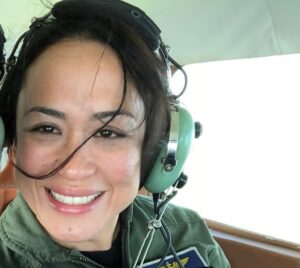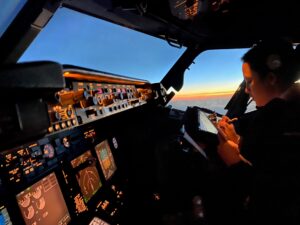
737 First Officer Vivian Cordero
What sparked your interest in aviation?
My family’s ties to the military are strong – my grandfather was in the Army and served in Vietnam and my stepfather, aunt and uncle were all Navy. My stepfather, was actually a Navy pilot and he was the one who took me to see the movie, Top Gun, which had a great impact on me. Growing up in a family that was mostly military inspired me to serve, while doing what I was passionate about (aviation).
International Women’s Day (IWD) is recognized annually on March 8 and is a global holiday celebrating the economic, political, cultural and social achievements of women. What does IWD mean to you? Why do you think it’s important to celebrate IWD?
It is important to acknowledge the many obstacles women have had to overcome in the last century to start making progress towards gender equality. Most people don’t know that when women won the right to vote in 1919, it took over 70 years to ratify. The Equal Rights Amendment, which is designed to provide legal rights for all regardless of sex, has yet to be ratified. As of today, it has only been ratified by 38 states. It wasn’t until 1973 when the first American woman was hired at a major U.S. airline, which coincidently, was the same year the U.S. Navy accepted the first class of six female naval aviators. Fast forward to this year’s Super Bowl, where the flyover was the first to consist of all female pilots. Progress has been made, but there is still much to be done.
This year’s International Women’s Day theme is #EmbraceEquity, what does this mean to you?
To me, the term Embrace is synonymous with Acceptance. Women in the workplace have yet not been truly embraced, or accepted, as they are still not being afforded the same opportunities and benefits as our male counterparts. The saying goes “Acceptance is half the battle.” While there have been scattered victories in the last centuries, equality for women has not yet been won.
That said, we have come a long way and women are fortunate that in certain industries there are set pays scales, such as pilots under contract and in the military. Unfortunately there are countless women in varying workplaces who do not enjoy those same circumstances.
What woman has positively impacted/inspired you in your career and what’s one lesson she taught you?

Vivian in the cockpit.
The woman who has had the most impact on me was my first female instructor in Navy Flight School. We were introduced about seven years earlier when I was in college, and she was in her first operational squadron flying the P-3C Orion. She mentored me through college and flight school and the timing worked out that she was the very person to teach me how to fly the P-3C. Her sense of purpose, empathy, and sheer passion is extremely unique and it is a great example for me – these are the qualities that I want to embrace as both a pilot and a leader. She leads by example, but with an extraordinary level of kindness and understanding that enables her to draw out the best in anyone with whom she interacts. We have become lifelong friends and she is like a sister to me.
At Atlas, we are proud of our culture of inclusive diversity, and we are committed to making even further progress to advance diversity, equity, and inclusion (DEI) within the workplace. How can we get more girls interested in aviation?
In order to get more girls interested in aviation, it’s important to start interacting with them as early as the middle school through career days and scholarship opportunities that provide monetary assistance for flight training. The outreach must also include inner city schools, because often girls in these communities are not aware of aviation as a career possibility.
On International Women’s Day, what is the most important message or piece of advice you want to send out to young women?
There are still so few of us in aviation. We have been underrepresented for a very long time. In the United States, women make up just under six percent of the pilot population. It is so important that women always remember to support one another and work together to continue the fight for full equality.
We will never be fully equal in the workplace until we have the same opportunities, legal rights, and benefits as men. We need to work together to achieve that.